白い目で見る
白い目で見る
しろいめでみる
to look coldly at; to turn a cold shoulder
彼は性格が悪いのでみんなが白い目で見ています。 かれ は せいかく が わるい ので みんな が しろいめでみています。 Because he has a bad personality, everyone looks at him scornfully.
(人)を白い目で見る: look at someone with disapproval / regard someone with disdain
More Posts from Earthquakedeer and Others
German da-compound words
(english to german)
1. Above that - darüber
2. Through that - dadurch
3. Around that - darum
4. Out of that - daraus
5. With that - damit
6. After that - danach
7. For that - dafür
8. From that - davon
9. Against that - dagegen
10. In that - darin
11. Under that- darunter
12. Next to that - daneben
13. Behind that - dahinter
14. On that - darauf

「声かけてもらえると助かる」”I’d appreciate it if you could call me.”
〜てもらえると助かる (~てもらえるとたすかる) “I’d appreciate it if you could ~/it’d be helpful if you could ~”
This grammar point is a really polite way to ask someone to do something for you.
The 〜てもらえる part is from the potential form of one of the grammar points for receiving favors 〜てもらう So basically もらう (to receive) –> もらえる (to be able to receive) 〜てくれる can be used too but 〜てもらう has a more thankful feel to it and the verb 助かる means “to be saved” or “to be helped”
Ex: 明日、空港に迎えに来てもらえると助かります。 あした、くうこうにむかえにきてもらえるとたすかります。 I’d appreciate it if you could pick me up tomorrow from the airport.

cute onomatope words

ビュービュー whistling sound; sound of the wind
わくわく tremble; excited
ぽかぽか nice and warm
ふんわり gently; airily; fluffy
ピンピン lively
にこにこ friendly smile
そっと softly; gently; quietly
すらすら smoothly
すやすや sleeping peacefully
ザーザー heavy rainfall
さらさら murmuring
ころころ lightly rolling
きらきら sparkle
ふわふわ fluffy
ぴかぴか glitter; twinkle
my favourite thing about the ancient egyptian numerals is that once you get to a certain point really high up in numbers you just have this little guy holding out his arms saying “a whole fuckin lot of numbers”

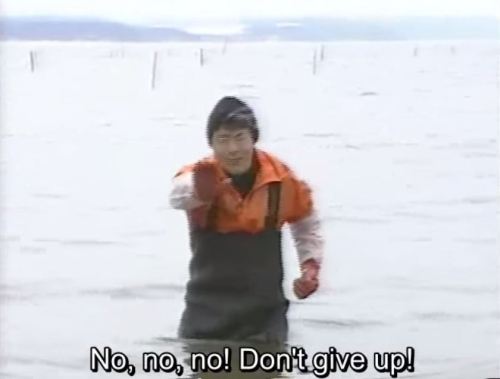
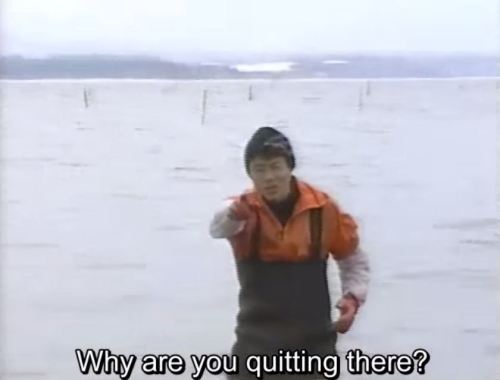
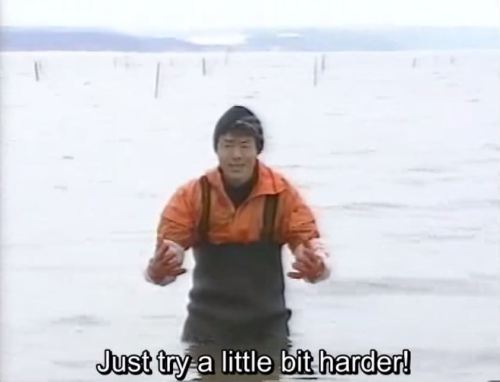

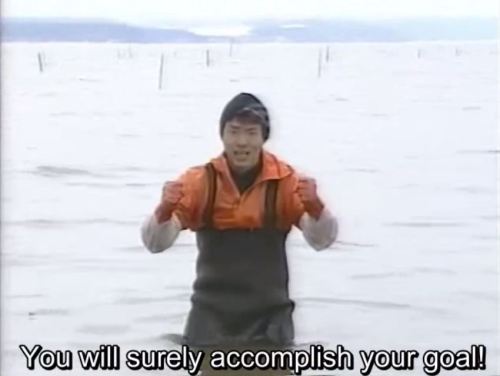
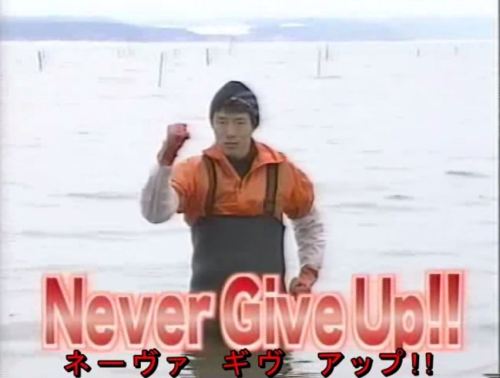
我田引水
がでんいんすい
Literally: Drawing water for your own rice paddy. Meaning: Doing or saying things for your own benefit.
(via uni-venture)

Sometimes, when we are presenting, our bodies act completely irrationally. Sweating, stuttering, or just shutting down completely are all things I have encountered during public speaking; behaviour that is usually connected to extreme danger and fleeing behaviour. Completely unnecessary, as your teacher won’t kill you (hopefully), but trying to convince your body to be just as rational is a tough task. Turns out that this is exactly what we’re going to do.
The basis for this (personal) advice all lies in my musical training, where posture is extremely important. Performance practice lessons have taught me one important thing: you can trick your body into thinking it’s okay, and with that, your audience. disclaimer: I have posted this information before in a slightly different way. Regard this as an updated version. Hopefully one with better spelling.
hoooooow???
Stand up and try to follow these instructions. I’m your only audience right now, so mistakes aren’t a problem.
Start by relaxing your shoulders. Many people tense their shoulders when they’re anxious, which is a very natural reaction. However, tension in your shoulder automatically reaches through to your back and arms, and even your neck, tensing up your entire upper body. It’s confirming to your brain that yes! this is scary! Well, brain is wrong and we’re going to prove it wrong by relaxing our shoulders. Just let them hang down (make sure you don’t start leaning forward though, it should be just your shoulders). Doesn’t that immediately feel more relaxed?
Keep your feet a little bit apart, firm on the ground. This sends the message to your brain and audience that a single push will not have you fall over. Standing with your legs closely together simply isn’t as stable, and you want to radiate stability and confidence. Even if you’re feeling dizzy, this simple way of pretending will keep your feet on the ground. Literally.
Chin up, back straight, eyes at the audience. I used to tend to look at the ground, or to lean forward. No, no no! You want to maintain an open posture, and to address the entire audience. When you do this, you’ll look more secure, and maybe you’ll even notice people will listen to you more closely. Make sure you address the entire room, and not just one spot. if you’re scared to look at faces, look at the back wall. But not just one spot, find some nice different wall spots to look at.
What to do with your hands? I know I used to put my hands in my pocket, or fidget with something. Instead, try to talk with your hands more. When you’re using gestures, people will usually pay more attention to what you’re saying, and they’ll sometimes understand more easily (if you’re interested as to why, message me).
Do not hide. This is special advice to musicians, too. I used to hide behind my music stand because it was nice and safe. During public speaking it’s easy to hide behind some notes or to stand behind other people of your group, maybe. Don’t. Remember, fake the confident posture till you make it.
When you’re finished, don’t stop pretending just yet. When people ask how it went, always say it went okay. This is so so so important! Because if you’d say “ugh it was awful!! So many things went wrong, I suck at presenting!” they’ll start thinking hmm, yeah, there were indeed some mistakes… Could have been better. Whereas if you just say it was okay or good, or even decent, they’ll hardly even question it and will most likely remember the positive aspects, as humans tend to do.
I promise this works, at least to some extent. It may not help you get rid of anxiety right away, especially in really severe cases, but it can help you feel more at ease in front of a group. After that, you can start working on other things, such as volume, intonation, powerpoint use etc.
Just take a few seconds before you start talking to breathe, focus on those muscles, and to follow this with an amazing presentation (and a good grade).
You can always send me an ask for advice on public speaking! Even though I’m not a professional coach or whatever, I have overcome my speaking anxiety and maybe I can be of any help at all <3
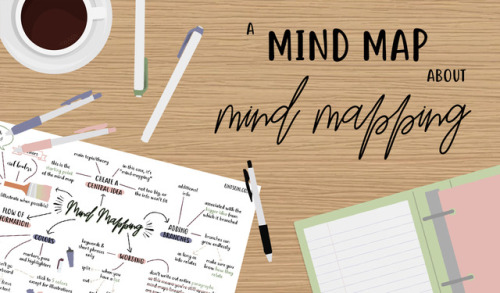


A MIND MAP ABOUT MIND-MAPPING
If you know me, you’d know that I am a highly visual person. I love learning from images and layouts, and my spatial intelligence is probably my strongest type of intelligence. Because of this, I often use mind maps to study, and so do a lot of other people. However, there are people who don’t really know how to make and utilize a mind map effectively. That’s what this post is for! Here’s how you can make your mind maps more effective and thus enable you to retain more information. (P.S. you might wanna zoom in)
By no means am I an expert in mind-mapping; these are just some habits I have when making a mind map that successfully does its job of helping me remember the topics I’m studying.
If you have any questions, feel free to drop an ask!
xx jo
-
 peachpool liked this · 5 years ago
peachpool liked this · 5 years ago -
 necropasta liked this · 5 years ago
necropasta liked this · 5 years ago -
 yeolipollie reblogged this · 5 years ago
yeolipollie reblogged this · 5 years ago -
 hoyatzu liked this · 6 years ago
hoyatzu liked this · 6 years ago -
 chanhie99ss liked this · 7 years ago
chanhie99ss liked this · 7 years ago -
 gabrydd-blog liked this · 7 years ago
gabrydd-blog liked this · 7 years ago -
 8danaes8justapassingwitch8 liked this · 7 years ago
8danaes8justapassingwitch8 liked this · 7 years ago -
 loeystudies liked this · 7 years ago
loeystudies liked this · 7 years ago -
 soup-moon liked this · 7 years ago
soup-moon liked this · 7 years ago -
 fredio liked this · 7 years ago
fredio liked this · 7 years ago -
 7-o-iii liked this · 7 years ago
7-o-iii liked this · 7 years ago -
 babits-please liked this · 7 years ago
babits-please liked this · 7 years ago -
 languagesandfrens reblogged this · 7 years ago
languagesandfrens reblogged this · 7 years ago -
 earthquakedeer reblogged this · 7 years ago
earthquakedeer reblogged this · 7 years ago -
 hopeless-chan reblogged this · 7 years ago
hopeless-chan reblogged this · 7 years ago -
 optaihnal-blog liked this · 7 years ago
optaihnal-blog liked this · 7 years ago -
 amasseuro liked this · 7 years ago
amasseuro liked this · 7 years ago -
 otakusentai8000 liked this · 7 years ago
otakusentai8000 liked this · 7 years ago -
 tokumeino90 reblogged this · 7 years ago
tokumeino90 reblogged this · 7 years ago -
 shihohinmakai liked this · 7 years ago
shihohinmakai liked this · 7 years ago -
 flounderingjapanesestudent reblogged this · 8 years ago
flounderingjapanesestudent reblogged this · 8 years ago -
 pill-bee liked this · 8 years ago
pill-bee liked this · 8 years ago -
 fuhhfjgj reblogged this · 8 years ago
fuhhfjgj reblogged this · 8 years ago -
 hareyaka reblogged this · 8 years ago
hareyaka reblogged this · 8 years ago -
 sombershika-blog reblogged this · 8 years ago
sombershika-blog reblogged this · 8 years ago -
 jjoe246 liked this · 8 years ago
jjoe246 liked this · 8 years ago -
 yoruzakura reblogged this · 8 years ago
yoruzakura reblogged this · 8 years ago -
 spaceboybebop liked this · 8 years ago
spaceboybebop liked this · 8 years ago -
 basking-robin liked this · 8 years ago
basking-robin liked this · 8 years ago -
 somischievous liked this · 8 years ago
somischievous liked this · 8 years ago -
 maresydotes liked this · 8 years ago
maresydotes liked this · 8 years ago -
 anreg reblogged this · 8 years ago
anreg reblogged this · 8 years ago -
 ambergreyowl liked this · 8 years ago
ambergreyowl liked this · 8 years ago -
 voltageunlimited reblogged this · 8 years ago
voltageunlimited reblogged this · 8 years ago -
 dryasiulia liked this · 8 years ago
dryasiulia liked this · 8 years ago -
 the-divine-guardian reblogged this · 8 years ago
the-divine-guardian reblogged this · 8 years ago -
 kuro-misaki liked this · 8 years ago
kuro-misaki liked this · 8 years ago -
 furuiuta reblogged this · 8 years ago
furuiuta reblogged this · 8 years ago -
 pinkcaseotakadl liked this · 8 years ago
pinkcaseotakadl liked this · 8 years ago -
 mikanbatake reblogged this · 8 years ago
mikanbatake reblogged this · 8 years ago
Just a person learning Japanese. Self-learner. If you're also studying Japanese and want to practice with someone (and you're also very much a beginner) then message me! はじめまして! さびーなです。よとしく!
196 posts

